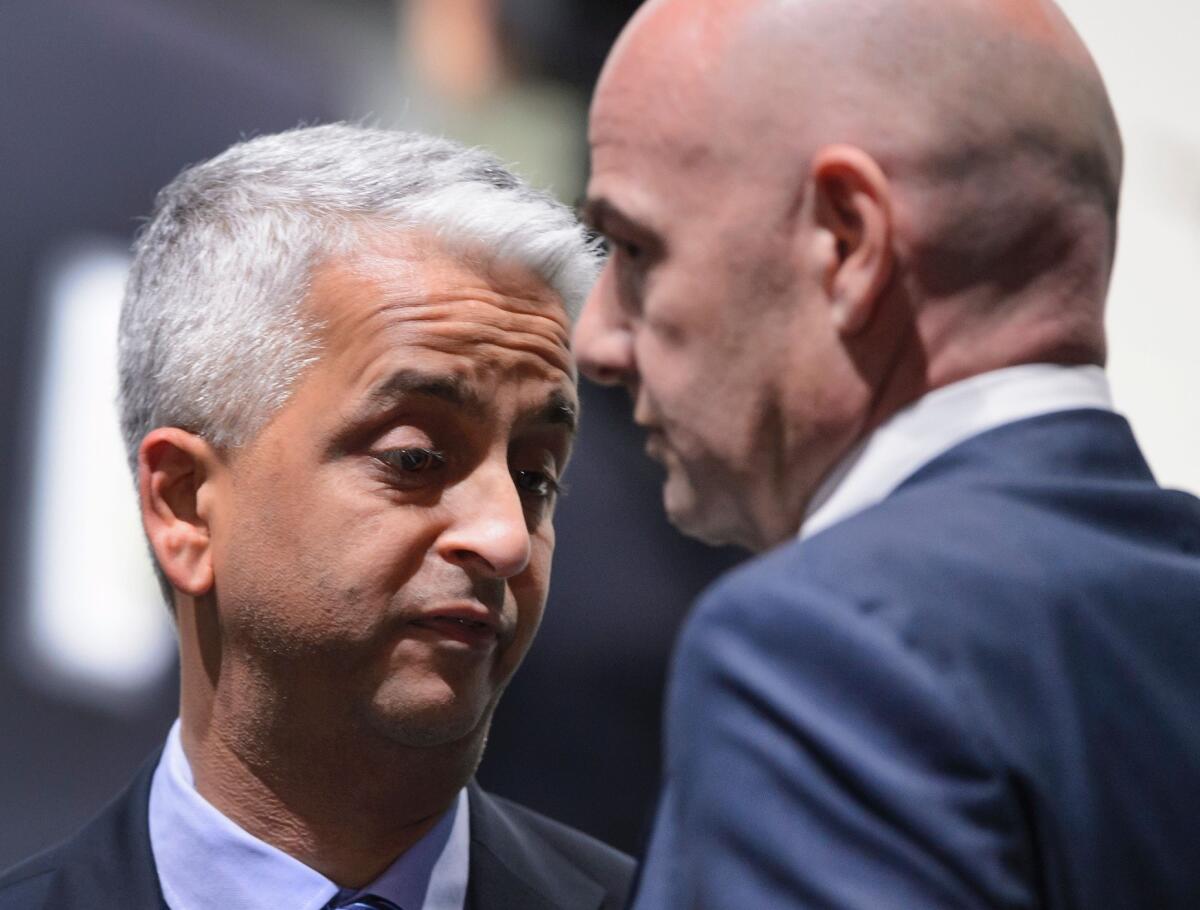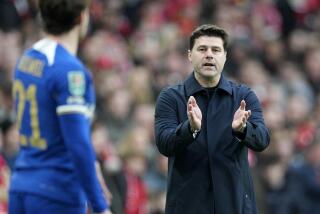Sunil Gulati pulls some serious strings to help soccer in the U.S.

FIFA presidential contender Gianni Infantino, right, stands with U.S. Soccer Federation President Sunil Gulatiduring the second round of voting in the FIFA presidential election on Feb. 26.
Gianni Infantino was the big winner in Friday’s FIFA elections, becoming the ninth man chosen to run soccer’s global governing body in a taut six-hour vote that took two ballots to decide.
But another man who wasn’t even in the race did almost as well.
By switching his allegiance from Jordan’s Prince Ali Bin Al Hussein to Infantino between the two rounds of voting, then actively encouraging others to do the same, U.S. Soccer Federation President Sunil Gulati not only swung the election but he may have cleared a path for the 2026 World Cup to come to America as well.
See the most-read stories in Sports this hour>>
“It’s a little early to talk about 2026, but you can rest assured that it got brought up in some of the discussions we’ve had over the last couple of days,” Gulati said.
That’s how it works at the highest level of world sports. When officials aren’t exchanging envelopes stuffed with cash, a practice FIFA says it no longer condones, they exert power by exchanging favors. Nothing wrong with that. It’s how the U.S. Congress used to get things done, back when it got things done.
So give Gulati credit for mastering the rules of the game and making the U.S. a major player in global soccer, even as its men’s team lags behind much of the rest of the world on the field.
But he had to serve a painful apprenticeship first.
Six years ago, Gulati was confident U.S. Soccer was going to land the 2022 World Cup, only to see it awarded to Qatar under mysterious circumstances that are still being investigated. What is known, however, is that Michel Platini, the president of the Union of European Football Assns. who had pledged to back the U.S., changed his mind on the day of the vote and took a handful of European countries with him.
On Friday, it was Gulati who brazenly worked the floor of the Zurich hockey arena where the election was held, pleading, cajoling and in one case slamming the table in front of a FIFA delegate to make his point. And it worked, with Infantino picking up 27 votes in the second round, 11 more than he needed to win the election.
Infantino has a huge debt to pay back and helping Gulati and U.S. Soccer land the 2026 World Cup would more than settle his account. And in many ways, that tournament would be preferable to the 2022 event. Imagine the U.S. playing the opening game July 4, 2026, in Philadelphia, where the Declaration of Independence had been ratified 250 years earlier?
Bidding on the tournament is likely to take place during Infantino’s term, which runs through the spring of 2019. And given the new president’s pledge to grow the World Cup field to 40 countries, an expansion that’s not feasible for another 10 years, awarding the 2026 tournament to the U.S. would serve his needs as well.
With the existing infrastructure, the organizational know-how and the billions in sponsorship dollars available in the U.S., a 2026 World Cup with 40 teams would be the best-attended and most-profitable soccer tournament in history, a success for which both Infantino and Gulati could take credit.
Although Gulati has been roundly criticized during his three terms as president of U.S. Soccer, on the whole it’s hard to rate his tenure as anything but a huge success. Major League Soccer has nearly doubled in size over the last 10 years and the women’s league Gulati helped form is about to begin its fourth season. Participation at the grassroots level has exploded, attendance has grown, TV ratings have repeatedly set records and Copa America, the world’s oldest international tournament, is coming to the U.S. for the first time in June.
Now Gulati is making a mark on the world stage as well.
But it’s not all rainbows and butterflies. Over the last nine months, the U.S. Department of Justice has unsealed indictments against 41 soccer officials, charging them with bribery, corruption and money laundering. Platini and Sepp Blatter, the FIFA president Infantino is replacing, have been banned by FIFA’s ethics committee and further charges could be coming since criminal investigations by Swiss, German and U.S. officials are ongoing.
So far U.S. Soccer has remained above the fray. But many of the crimes the U.S. government is alleging took place on U.S. soil and involved officials of CONCACAF, the regional soccer body of which the U.S. is the largest and most powerful member. As a result, it’s hard to believe Gulati knew nothing about two decades of behavior so brazen it nearly brought down the richest and most powerful sports organization on the planet.
Gulati didn’t do himself any favors when he declined an invitation to share what he knew with a congressional panel last summer, sending his No. 2 man, Dan Flynn, to testify instead. Flynn only added to the uncertainty when he said he wasn’t aware of any corruption, yet admitted he had a “level of discomfort” he never bothered to share with anyone.
Not exactly a smoking gun. But it’s also far short of exoneration.
Gulati played the game the right way last week, using the power of persuasion to elect Infantino, a self-described reformer, while furthering the goals of U.S. Soccer and giving his group global clout at the same time. But until the cloud of doubt that hovers above U.S. Soccer is lifted, Gulati may well have to talk softly while wielding that big stick.
Follow Kevin Baxter on Twitter @kbaxter11







